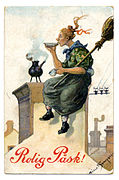Easter witch


Easter witches (Swedish: påskkärring, 'easter hag',[1] 'easter witch',[1] Finland Swedish: påskhäxa, 'easter witch', Finnish: trulli, 'trulli') is an old Swedish legend about witches flying to Blockula (Swedish: Blåkulla, Blå Jungfrun) on brooms on the Thursday before Easter (Maundy Thursday, sv:Skärtorsdagen) or on the night between the Wednesday (Holy Wednesday, sv:Dymmelonsdag) and Thursday before, and returning on Easter.[2]
In the modern era, children dress up as witches, old ladies or in old men's clothing and go door to door distributing greetings and often receiving treats in return.[3] In Finland, the Easter witch custom (virvonta) comes from the old Karelian Orthodox Christian tradition.
Witch persecutions
[edit]In the 17th century, fear of witches caused brutal persecution of innocent women and trials. More than 200 women were tortured to death in Sweden. The last woman was wrongfully sentenced in 1704 but it was not until 1779 that the death penalty for witchcraft was repealed. Because of this during this time period doors and dampers were secured to guard against the travel of the witches to Blåkulla to meet the Devil. Any tools the witches could use on their trip were put away on Maundy Thursday. Barn doors were secured to prevent the witches from milking or riding the animals.[4]
Modern times
[edit]In Sweden and Finland, it is an Easter tradition for children to dress as witches, old women and old men and go door to door for treats similar to the trick-or-treating tradition of Halloween on Maundy Thursday or the day before Easter (Holy Saturday).[5] The children sometimes present hand-made cards and other greetings.[2] Related to warding off witchcraft and at a similar time of year is the Walpurgis Night celebration.
Image gallery
[edit]-
Swedish Easter card from 1916. Witch with broom and coffee pot.
-
Easter witch handing out gifts (tree twigs) in Finland in 1998. The small basket is for thank you gifts.
-
Boys dressed as witches in Finland in 2009
References
[edit]- ^ a b Prisma's Swedish-English and English-Swedish Dictionary (Third ed.). Minneapolis: University of Minnesota Press. 1995. pp. 304, 424.
- ^ a b "Små påskhäxor på jakt efter godis". Yle. April 13, 2017. Archived from the original on 8 February 2023.
- ^ "Svenskspråkiga påskhäxor går ut på påskaftonen". Yle. March 13, 2010. Archived from the original on 23 January 2023.
- ^ "Skärtorsdag". Nordiska Museet. 26 February 2013. Archived from the original on 27 March 2023. Retrieved April 3, 2020.
- ^ "Sweden's Easter Witches". Time. 9 April 2009. Archived from the original on 22 May 2023. Retrieved April 3, 2020.
External links
[edit]Media related to Easter witches at Wikimedia Commons



